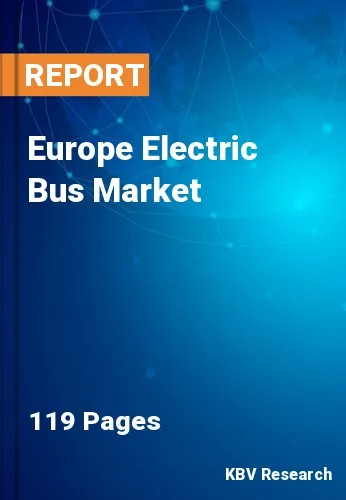The Europe Electric Bus Market would witness market growth of 19.5% CAGR during the forecast period (2023-2030).
The primary focus of several market participants is making significant financial investments in R&D and adopting new technology in electric buses. Artificial intelligence integration is anticipated to increase operational effectiveness, increase safety, and lower carbon emissions, hence accelerating the growth of the market as a whole. To expand the usage of electric buses, numerous governments in Europe are launching a variety of projects.
For instance, the Clean Vehicles Directive, which the European Commission published in August 2021, called for the procurement of 45% of vehicles with zero emissions 65% by 2030 in European nations. Phase II of the FAME Scheme, with a budget of Rs. 10,000 crores for a three-year period beginning on April 1, 2019, has been authorized by the government. To increase demand for xEVs, 86 percent of overall financial support has been set aside for the Demand Incentive. By supporting 7000 electric buses, this phase hopes to create demand. Furthermore, new market entrants are primarily focused on growing their market share by launching new buses in developing nations.
The ICCT also stated that a significant impact was also played by the Clean Vehicles Directive, which went into effect in August 2021. The Directive mandates that between August 2021 and December 2025, Member States must purchase 24%–45% of all buses (i.e., anything other than a diesel-only bus) using alternative fuels. By the end of 2021, sales of diesel-only buses had drastically decreased, demonstrating the impact. Zero-emission powertrains are required to meet half of these goals. The targets will grow to 33%-65% in 2026, implying another drop in diesel in the coming years. The rising demand for e-buses mostly reflects the tendency among cities to accept electrification as well as new mobility business technologies and models, like shared mobility and autonomous vehicles. Hence, such factors are propelling the growth of the market in Europe.
The Germany market dominated the Europe Electric Bus Market by Country in 2022, and would continue to be a dominant market till 2030; thereby, achieving a market value of $4,235.2 Million by 2030. The UK market is estimated to grow at a CAGR of 18.4% during (2023 - 2030). Additionally, The France market would exhibit a CAGR of 20.4% during (2023 - 2030).
Based on Battery Type, the market is segmented into Lithium Iron Phosphate, and Lithium Nickel Manganese Cobalt Oxide. Based on Vehicle, the market is segmented into Battery Electric Vehicle, Plug-in Hybrid Electric Vehicle, and Fuel Cell Electric Vehicle. Based on Application, the market is segmented into Intercity, and Intracity. Based on End-use, the market is segmented into Public, and Private. Based on countries, the market is segmented into Germany, UK, France, Russia, Spain, Italy, and Rest of Europe.
Free Valuable Insights: The Worldwide Electric Bus Market is Projected to reach USD 121.2 Billion by 2030, at a CAGR of 20.8%
The market research report covers the analysis of key stake holders of the market. Key companies profiled in the report include BYD Company Ltd., Volvo Group, Solaris Bus & Coach sp. z o.o. (Construcciones y Auxiliar de Ferrocarriles, S.A.), Volkswagen AG, Nissan Motor Co., Ltd, Ashok Leyland Limited (Hinduja Group Ltd.), Mercedes-Benz Group AG (Daimler Truck Holding AG), Yutong Bus Co., Ltd., Tata Motors Limited (Tata Group) and Hyundai Motor Company.
By Battery Type
By Vehicle
By Application
By End-Use
By Country
Our team of dedicated experts can provide you with attractive expansion opportunities for your business.

